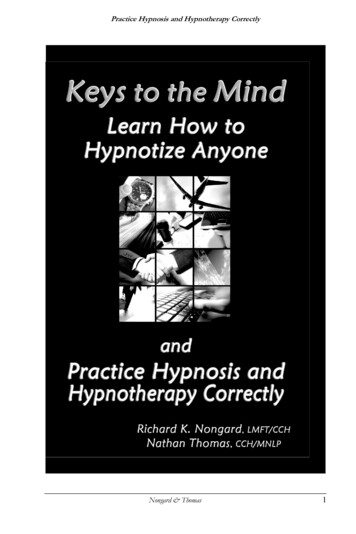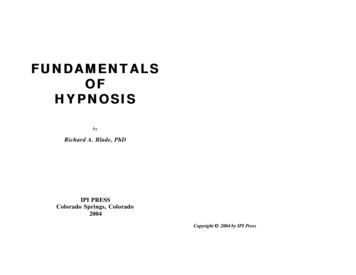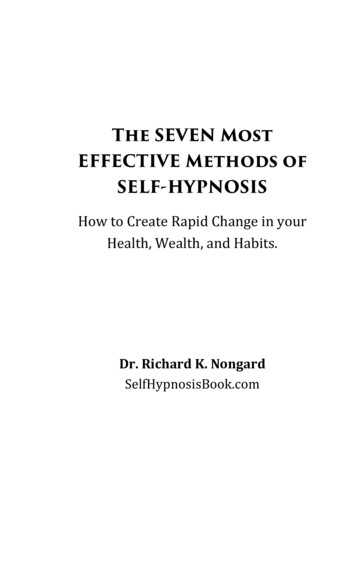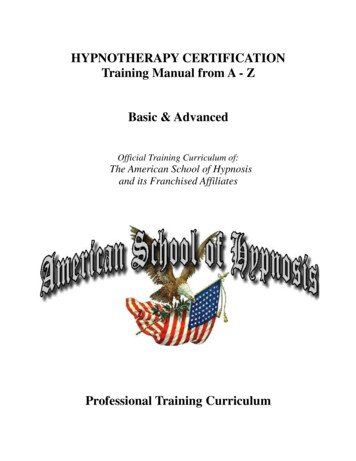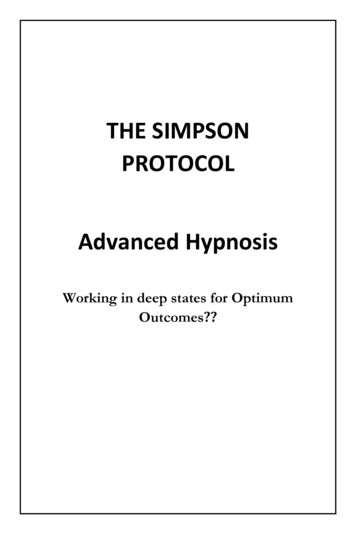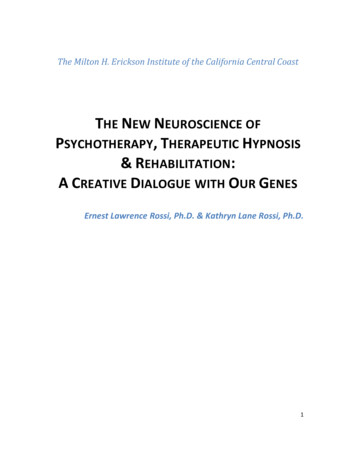
Transcription
1
Beginners Guide to HypnosisYour Questions AnsweredEdited and Distributed by Calvin (Cal) Banyan, MA, CH, BCH, CI, MCPHI, FNGHDerived from a previously published book written by Dr. Brian Knight, now owned by Calvin D. Banyan.Additional Hypnosis Resourceswww.CalBanyan.com ‐ 100 Free Hypnosis Training Videos and Morewww.Hypnosis.ORG ‐ Free Hypnosis Articles, Directory and More for Everyonewww.OurHypnoSpace.com ‐ Free Networking for Hypnosis ProfessionalsNote: You may give away this ebook. However, it cannot be distributed as part of any “for profit”enterprise without written permission from Cal Banyan.You are NOT allowed to make any changes. All hyperlinks and contact information must be left in thispublication.Nor, are you permitted to publish any part of this eBook or the eBook as a whole in any formwhatsoever, without the express written permission from Cal Banyan.Cal Banyan purchased this book from the original author so that it could be shared freely with thehypnosis community. The opinion of the original author is not necessarily the opinion of Cal Banyan.I hope you will enjoy this book and share it with your friends.Published by the Banyan Hypnosis Center for Training & Services, Inc.www.HypnosisCenter.comCopyright Calvin D. Banyan 2010.2
tage Hypnosis17The #1 Question183
IntroductionThis was an ebook that was written by another author, which I bought from him along with a website.Now that I have this book, I thought the best thing to do with it is to give it away to those interested inlearning about hypnosis. I especially thought it would be a good resource for those who are looking atlearning basic hypnosis.The anonymous author wrote in his introduction to the original version of this ebook, “Every person newto hypnosis asks the same questions. Decades ago I also asked them. Lately, as a grumpy old man, I’vegrown tired of having to give the same answers over and over. So I decided to compile the questions andanswers into one ebook which is in total, a very good guide for beginners wanting to learn abouthypnosis.”With that, I hope you will learn a lot from this book and it will kindle your desire to learn more abouthypnosis, and hopefully one day, I will either see you in class or find that you are a new graduate of oneof our distance learning courses.Sincerely,Cal BanyanBanyan Hypnosis Center for Training & Services, Incorporated1431 Warner Avenue, Suite ETustin, California 927804
The rest of this book is written in a question and answer format with the author’s commentsinterspersed. To help you further, from time to time you will run across hyperlinks in the text that willtake you to additional information. This has been done in order for you to have access to new andupdated material. Alas, every book becomes dated as soon as it is published, but by providing you withthe embedded links, we expect that the information provided will be updated regularly.So now, on with the questions:1. Is it true that can't be hypnotized unless you are willing to be hypnotized? (In other words, ifwe're sitting and talking, I couldn't be put under hypnosis unless I wanted to be put under. Manyyears back we had a hypnotist at school and that is what he said too.)Depends on what you mean by "willing". People are swayed by a politician or a salesman using hypnotictechniques, ditto with TV ads. But, you see, no amount of hamburger ads would persuade me to buy ahamburger because just the thought of eating something with all those chemicals, animal cruelty andenvironmental devastation, makes me feel sick. So, I'm "not willing to be hypnotized to eat red meat.”2. Is it true that you can't be hypnotized and not know you're being hypnotized? Example: We'retalking and without having a clue, you could hypnotize me. (Sure hope not.)Controversial. Hypnosis is like daydreaming. So if you're in awe of someone or say, falling in love with aguy, you might not realize that you are in a sort of trance‐like state.Basically, all this is words. You probably have an erroneous idea of what hypnosis is from bad movies,books and stage shows that deliberately make you think the hypnotized person is in some kind of other‐worldly state, under the control of the hypnotist. Not so.3. If you willingly are hypnotized, can you be made to forget what happened while you werehypnotized?” And then, when you're brought out of the hypnosis, you have no idea you were evenhypnotized in the first place?No one can MAKE you do or think anything, unless you want it. So you may ask the hypnotist to suggestamnesia. And you'll forget. But recall is always possible with a little verbal nudging.The "hidden observer" in your mind is watching continuously to keep you safe.Many people think that people who are hypnotized don’t remember it. And they have that erroneousbelief precisely because they have a totally wrong concept of hypnosis to begin with. In hypnosis, youare awake, aware, and conscious. You can even tell lies if you choose, you don't "wake up" because youwere not asleep. Time is very subjective. In hypnotherapy, the subjective passage of time can be sloweddown or speeded up. This is very useful for therapy.That wasn't enough for the enquirer. She wrote a follow‐up:5
4. Thank you for your prompt reply. I think you're probably right. I don't really know what hypnosisis. Regarding my 1st question, your example of the hamburgers was a good one. By willing, that'swhat I meant. Example: If I smoked (I don't) and I didn't want to stop, I couldn't be made to stopthrough hypnosis. Another example, if I see a dog, hypnosis couldn't make me think it's a horsebecause I wouldn't want to think that. Am I right?Right! Except that in the second example you could be "tricked" if you trusted the hypnotizer and weretold that a new language or a new definition, would now call the dog a horse. (If you were on stageyou’d readily identify the dog as a horse). But again, you still believe it because you want to. And, onceout of hypnosis, the absurdity would have you laughing.5. Regarding question #2 you hit the nail on the head. I thought the hypnotist was in control and ableto make you do things you didn't want to do. That's false?”Thought I'd made that point ‐‐ as you have above.6. From your explanation, am I right in saying the hypnotist can suggest things such as thirsty orhungry, but if you're not, you're not going to want a drink or food. He can suggest it but he can'tMAKE you want it. Right?Right. Why don't you read a good book on hypnosis?7. The last part of #3 regarding time. If I were in a session with you, you could make it seem like timehad passed quickly or slowly but if my appt. started at 3:00 and I left at 3:15 I would know time hadpassed. You couldn't make me think no time had passed. Correct?Couldn't MAKE you think anything. I didn't write that NO time had passed. I wrote that time (rememberthis is a human construct) is subjective so the hypnotic suggestion of time could be of stretching it, or ofshortening it but not too outlandish lengths.8. So to sum it up, (1) a hypnotist is not in control, (2) she can't make you do or think something youdo not want to do or think, and (3) she can't make you forget you were hypnotized because you arenot in a trance (sleep). Correct?Whether you're in a trance or not, is a controversial point. What, after all, is a trance? But, definitelynot sleep. How could you follow suggestions if you were asleep? Always amazes me that people don'twonder about that.9. I think my wrong ideas about hypnosis are like you said. From bad movies, etc. Are hypnosis andhypnotherapy one and the same?Hypnotherapy is the use of hypnosis to enable the therapist to conduct therapy.6
Definitions1. What is hypnosis?Although some definitions describe hypnosis in terms of interaction between people, hypnosis is notsomething one person "does" to another.Hypnosis is like daydreaming: a form of relaxed concentration. What is relaxed is, first the body andsecond, the conscious part of the mind2. Does it put you into a trance state?Some hypnotherapists believe our everyday sense of reality is actually a trance. That we need toawaken, to de‐hypnotize from the myths of what we think is real.For most practitioners, the most common view of hypnosis is that it is an altered state of consciousness;your awareness differs somehow to your everyday sense of reality. This is often referred to as being in atrance. However, for many, perhaps most people being in hypnosis do not seem much different to howthey feel at other times.3. So does that mean that you are not in a trance?The very existence of trance is challenged by some hypnosis authorities.4. So, is hypnosis just another name for relaxation?No. Often a person new to hypnosis will note that she feels relaxed. Often more deeply relaxed thanshe’s ever felt before. This has led to claims that hypnosis is nothing more than profound relaxation. Butlaboratory tests prove hypnosis is something more than relaxation: e.g., after hypnosis, the heart rateremains slowed down longer than after relaxation alone.5. Is hypnosis simply suggestion?What does this mean? That people in hypnosis will accept suggestions more readily than when not inhypnosis? That explains nothing.People are readily suggestible without hypnosis ‐‐ the mammoth advertising industry attests to that ‐‐and people in hypnosis by definition want to cooperate. Of course they accept suggestions.They suspend their disbelief as they would while reading a novel. But suggest something that isdistasteful to them and they'll quickly stop cooperating ‐‐ just as they'd drop a novel which offendedthem.6. Perhaps hypnosis is just role‐playing?7
Some theorists say that people think or do things in hypnosis because it's expected of them and bythem. They are fulfilling a role. They want to please the hypnotist. So there's no altered state ofconsciousness, there's simply a motivation to act as though hypnotized.This theory might hold for stage performances and the like but can hardly apply to surgery. Thousandsof hypnotized persons have benefited from operations with no chemical anesthetic.7. Is hypnosis a form of psychological conditioning?According to this explanation, a person learns through direct experience or through TV or the movies,how to behave 'hypnotized'.Another way to see hypnosis as something learned is to assert that a person becomes conditioned to aword stimulus such as "Relax." Once having allowed himself to relax, the client is thereafter conditionedto repeat the experience of relaxing upon hearing the stimulus‐word.8. Is Hypnosis a Form of Dissociation?This definition claims that in some as yet unexplained way, the mental functioning of a person iscompartmentalized and one part can be isolated from the others.Dissociation is an everyday conscious experience which begins in childhood, according to Dr. JosephineR. Hilgard, noted hypnosis researcher and author. When a person is engaged in conversation withsomeone else, he is also talking with himself and thinking ahead to his next comments.Children blithely slip in and out of fantasy lives, temporarily adopting make‐believe roles which theydiscard at will. This capacity to fantasize can be retained through practice and makes the dissociationcharacteristic of hypnosis less surprising.9. When you are in hypnosis are you asleep?No, you are conscious, awake and aware.10. So, what is hypnosis?Altered state, relaxation, heightened suggestibility, role‐playing, conditioning or dissociation, whateverhypnosis is, it enables a person to experience thoughts and images as though they were real.11. Does that mean it has nothing to do with the subconscious?Not necessarily. Many hypnotists define hypnosis as the bypassing of the critical [conscious] mind andaccessing of the subconscious.12. That sounds impressive, but what do we mean by the subconscious?8
Although some people equate the subconscious with the brain’s right hemisphere, the subconscious isprobably better understood in a metaphorical sense. For example, Freud claimed it is a cesspool ofsexual and violent urges while present‐day theorists are more likely to consider the subconscious to beeither a well‐spring of goodness or a storehouse of memories that normally lies outside our consciousawareness.Hypnotizability1. Can anyone be hypnotized?Generally speaking, yes. Any person of normal intelligence who is willing to follow instructions can behypnotized. The exception would be individuals who suffer from severe mental illness such asSchizophrenia.Many people, when they hear about hypnosis, say, "Well, I can't be hypnotized." These people havebeen misinformed, mostly by Hollywood, about what hypnosis is and is not. It is not necessary to be insome sort of other worldly trance to be in hypnosis. Hypnosis is a natural state which everyone moves inand out of throughout each day. Many of our everyday normal activities are actually performed underhypnosis without us being aware of it.An example of hypnosis is playing video games. Some people can play video games for hours in onesitting. If someone were to talk to you while you were in a video game session, you would be able torespond. Yet another good example of a hypnotic state is being on the computer. People who are usinga computer are focused on what they are doing, but can intelligently answer the phone when it rings.So, hypnosis is no different to playing video games or working on a computer. Most people engaged inthese activities would not think they are in a trance, but they are. They are in a light hypnotic tranceknown as Alpha.Oh, by the way, reading a fascinating article (like this one) is another form of hypnosis.surprise! You'rein hypnosis!!!In alpha, your mind is slowed down just a little, your focus is narrow, your breathing is slow, and you arerelaxed. Since you are up to 200 times more sug
Now that I have this book, I thought the best thing to do with it is to give it away to those interested in learning about hypnosis. I especially thought it would be a good resource for those who are looking at learning basic hypnosis.



